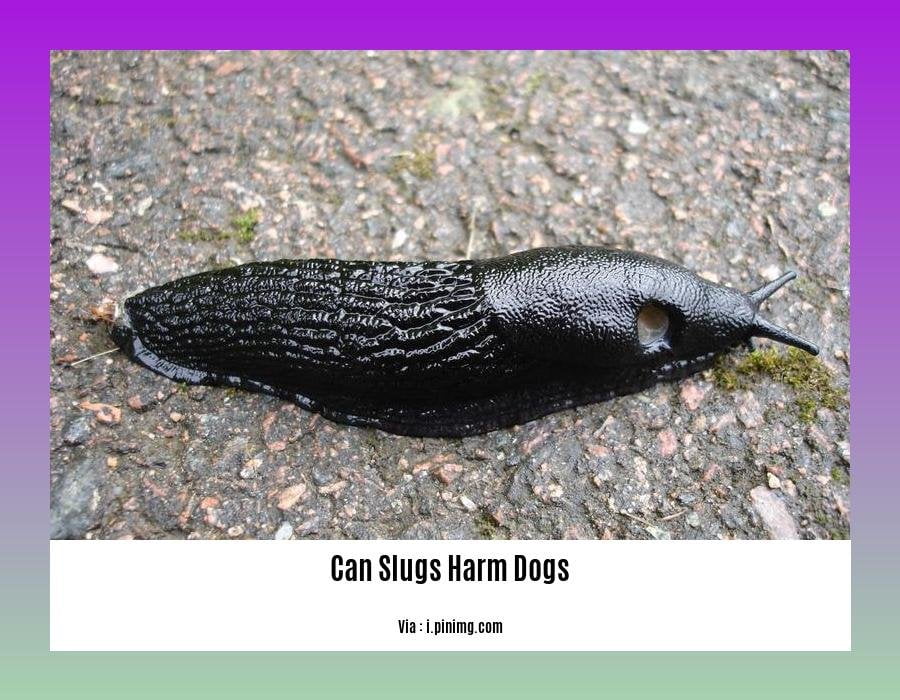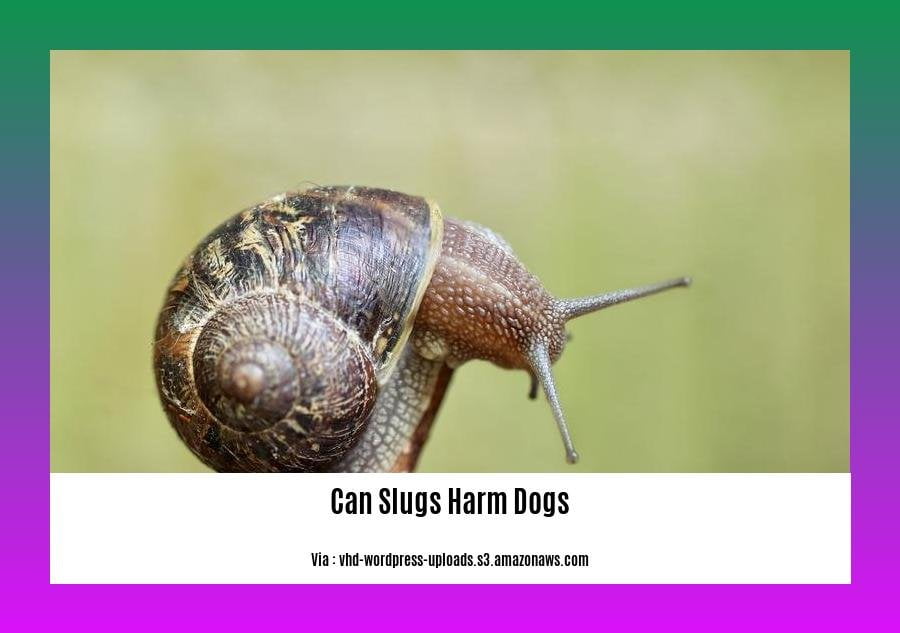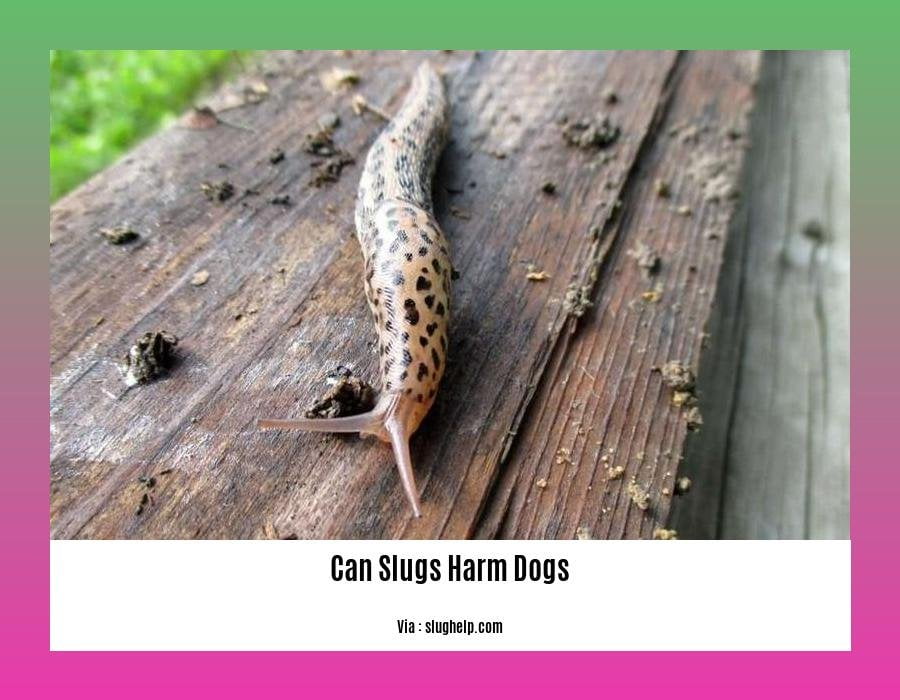Are slugs harmless garden creatures or potential dangers to our beloved canine companions? In this article, we delve into the hidden hazards that slugs can pose to dogs and uncover the symptoms, risks, and preventive measures pet owners should be aware of. From lungworm infections to the consequences of dogs ingesting slugs, we shed light on the often overlooked dangers of these slimy creatures. Join us as we unveil the potential hazards and explore how to keep our furry friends safe from the perils of slugs.
Key Takeaways:
- Slugs can pose a significant threat to dogs, carrying parasites that can lead to lungworm infection and even death if ingested.
- Lungworm infection can result in various health issues for dogs, including vomiting, seizures, coughing, difficulty breathing, weight loss, fatigue, and neurological problems.
- Not all slugs are toxic, but their consumption increases the likelihood of lungworm infestation. Common garden slugs and certain sea slugs can be harmful to dogs.
- Preventing slug infestation and protecting dogs from their harmful effects is crucial. Measures such as keeping the environment clean, avoiding leaving food and water bowls outside, inspecting for slugs regularly, and using appropriate preventive measures and treatments recommended by a veterinarian can significantly reduce the risk.
- Immediate veterinary care is necessary if slug ingestion is suspected, as diagnosis and treatment are essential to ensure the well-being and safety of dogs.
Can Slugs Harm Dogs? Unveiling the Potential Hazards

The Health Risks of Slugs to Dogs
Slugs may appear harmless, but they can actually pose serious risks to our furry companions. Ingesting slugs can lead to various health issues, including vomiting, seizures, and, in some cases, even death. These harmful effects are primarily due to the parasites that slugs carry, which can infect dogs when ingested. Lungworms, in particular, are a common concern associated with slugs.
Understanding Lungworms and Their Impacts
Lungworm infection can have devastating consequences for dogs. When dogs lick or ingest slugs that carry the larval stage of lungworms, they become susceptible to these parasites. Lungworms then reside in the dog’s body, leading to a range of health problems. Symptoms may include coughing, difficulty breathing, weight loss, fatigue, and in more severe cases, neurological issues.
Identifying the Risk from Different Types of Slugs
Not all slugs are toxic to dogs, but they do carry the risk of lungworm infection. For example, common garden slugs are not considered toxic, but their consumption increases the likelihood of lungworm infestation. It’s crucial to know the specific species in your area that may carry lungworms. Additionally, certain sea slugs can be deadly to dogs if ingested.
Prevention and Treatment Strategies
Preventing slug infestation and protecting our dogs from the harmful effects of slugs is essential. Here are some measures you can take to significantly reduce the risk to your canine companions:
- Keep your dog’s environment clean and remove any potential slug habitats.
- Avoid leaving food and water bowls outside, as they can attract slugs and their predators.
- Regularly inspect your dog’s toys, bedding, and outdoor areas for slugs.
- Consult with your veterinarian to determine appropriate preventive measures, such as parasite control medications.
- If you suspect your dog has ingested slugs, seek immediate veterinary care for diagnosis and treatment.
Conclusion
It’s crucial for dog owners to be aware of the dangers that slugs can impose on their pets. Slugs may seem harmless, but they carry parasites that can cause lungworm infections in dogs, leading to severe health issues and even death. By understanding these risks, implementing preventive measures, and promptly addressing any potential slug ingestion, we can ensure the well-being and safety of our beloved furry friends.
Can slugs harm dogs? Find out if these slimy creatures can pose a threat to your furry friend by clicking here.
Are you aware of the dangers slugs can bring to your canine companion? Discover the potential risks of slugs on dogs by clicking here.
Curious about the compatibility of turtles and tortoises? Learn more about whether these reptiles can live harmoniously together by clicking here.
Ever wondered how turtles and tortoises reproduce? Unravel the mysteries of their mating habits by clicking here.
Can Slugs Harm Dogs if Eaten?

Slugs may seem harmless, but they can actually pose a significant threat to our furry companions. Not only do they carry parasites that can lead to lungworm infection in dogs, but certain species of slugs can be lethal if ingested. In this article, we will explore the dangers that slugs present to dogs and how to protect our beloved pets.
The Health Risks of Slugs to Dogs
Ingesting slugs can result in various health issues for dogs, ranging from vomiting to seizures and even death. The primary cause of these harmful effects is the parasites that slugs can carry, which can infect dogs upon ingestion. One particular concern associated with slugs is lungworm infection.
Understanding Lungworms and Their Impacts
Lungworm infection can have devastating consequences for dogs. When dogs lick or ingest slugs that carry the infective larval stage of lungworms, they become susceptible to these parasites. Once inside the dog’s body, lungworms can cause a range of health issues. Symptoms of lungworm infection may include coughing, difficulty breathing, weight loss, fatigue, and even neurological problems.
Identifying the Risk from Different Types of Slugs
While not all slugs are toxic to dogs, they still pose a risk of lungworm infection. Common garden slugs, for example, are not considered toxic, but ingesting them increases the likelihood of lungworm infestation. It is essential to be aware of the specific slug species in your area that may carry lungworms. Additionally, certain sea slugs can be deadly to dogs if ingested.
Prevention and Treatment Strategies
Preventing slug infestation and protecting our dogs from their harmful effects is paramount. Implementing the following measures can significantly reduce the risk to our canine companions:
- Keep your dog’s environment clean and remove any potential slug habitats.
- Avoid leaving food and water bowls outside, as they can attract both slugs and their predators.
- Regularly inspect your dog’s toys, bedding, and outdoor areas for slugs.
- Consult with your veterinarian for appropriate preventive measures such as parasite control medications.
- If you suspect your dog has ingested slugs, seek immediate veterinary care for diagnosis and treatment.
Key Takeaways:
- Slugs can harm dogs by carrying parasites that can lead to lungworm infection.
- Ingesting slugs can result in vomiting, seizures, and even death in dogs.
- Lungworm infection can cause coughing, difficulty breathing, weight loss, fatigue, and neurological problems.
- While common garden slugs are not toxic, they increase the risk of lungworm infestation.
- Certain sea slugs can be deadly to dogs if ingested.
- Preventive measures include keeping the dog’s environment clean, avoiding leaving food and water outside, regularly inspecting for slugs, and consulting with a veterinarian for appropriate preventive measures.
- Immediate veterinary care is necessary if you suspect your dog has ingested slugs.
Sources:
– “Protect Your Pup: The Truth About Slugs and Dogs” – Dog House FM
– “Are Slugs Poisonous to Dogs?” – Doggysaurus
[My Dog Licked A Slug]
Slugs may seem harmless, but if your dog licks a slug, it can lead to potential dangers. The slime that slugs leave behind can contain bacteria and toxins that are harmful to dogs if ingested. Even a small amount of contact with slug or snail slime can pass on infections, making it essential to take immediate action to protect your dog’s health.
The Risks of Slug Exposure
When a dog licks or ingests a slug, they are at risk of encountering various health issues. Slug slime can irritate a dog’s digestive system, leading to vomiting and diarrhea. Ingesting the slug itself or licking its slime trail can be just as dangerous, as the slime may contain lungworm larvae. Dogs can contract lungworm by ingesting infected slime trails, which poses significant health risks.
Lungworm Infection and Its Consequences
Lungworm, also known as Angiostrongylus vasorum, is a parasite that slugs can carry. If a dog ingests a slug carrying lungworm larvae, it can result in severe health problems. The parasite can affect the dog’s heart, lungs, and other organs, leading to breathing difficulties, coughing, tiring easily, poor blood clotting, excessive bleeding, weight loss, and even death. Puppies and dogs with compromised immune systems are particularly vulnerable to lungworm infection.
Steps to Take if Your Dog Licks a Slug
If you suspect that your dog has ingested a slug or licked its slime, there are several steps you can take to minimize the potential harm:
Contact Your Veterinarian: It is crucial to seek professional advice from your veterinarian as soon as possible. They can provide guidance based on your dog’s specific situation and recommend appropriate measures to take.
Induce Vomiting (if advised): In some cases, your veterinarian may advise you to induce vomiting in your dog to remove any harmful substances from their system. You can use hydrogen peroxide, as recommended by some sources, but always follow your veterinarian’s instructions to ensure your dog’s safety.
Preventing Further Exposure: To prevent further exposure to slugs and their slime, discourage your dog from eating grass or investigating areas where slugs are commonly found. Keep your dog’s environment clean and free from potential slug habitats.
Parasite Prevention: Consult with your veterinarian about appropriate parasite control medications that can help prevent lungworm infection and other parasite-related issues in dogs. Regular check-ups and preventive measures are crucial for your dog’s overall well-being.
Key Takeaways:
- Slugs can pose potential risks to dogs if they lick the slime or ingest the slug.
- Slug slime may contain bacteria, toxins, and lungworm larvae.
- Lungworm infection can lead to serious health issues and even death in dogs.
- Consult your veterinarian if your dog has ingested a slug or exposed to slug slime.
- Preventive measures, such as inducing vomiting (if advised), discouraging contact with slugs, and using parasite control medications, can help protect your dog’s health.
Sources:
Citation
FAQ
Q1: What are the symptoms of lungworm infection in dogs?
A1: The symptoms of lungworm infection in dogs may include coughing, difficulty breathing, weight loss, fatigue, and even neurological problems.
Q2: Can slugs harm dogs if eaten?
A2: Yes, slugs can harm dogs if eaten. Ingesting slugs can result in various issues such as vomiting, seizures, and even death, primarily due to the parasites that slugs carry.
Q3: What are the potential hazards of dogs eating slugs?
A3: Dogs eating slugs can be exposed to the risk of lungworm infection. Additionally, some species of slugs can be lethal if ingested, causing severe health problems in dogs.
Q4: What should I do if my dog licked a slug?
A4: If your dog licked a slug, it is important to take immediate action. Slug slime can contain bacteria and toxins that can harm your dog if ingested. You can induce vomiting using hydrogen peroxide and discourage further contact with slugs or snails.
Q5: How can I prevent my dog from getting lungworm from slugs?
A5: To prevent your dog from getting lungworm from slugs, you should keep your dog’s environment clean, remove any potential slug habitats, and regularly inspect your dog’s toys, bedding, and outdoor areas for slugs. Additionally, consult with your veterinarian for appropriate preventive measures such as parasite control medications.
- Sept 31 Myth: Unveiling Calendar Secrets - March 18, 2025
- How Long & Till December 18, 2025: Accurate Countdown Guide - March 18, 2025
- Discover Japanese Artists: A Complete History - March 18, 2025
















